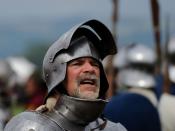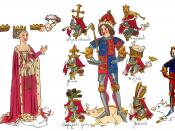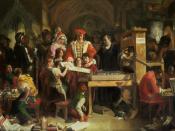"For over 500 years the last Plantagenet King of England has been vilified as a usurper, a murderer, a monster but the tide is turning... Richard III lost the battle of Bosworth but" this writer "aims to win the war in rescuing his reputation."#
In 1485, a " diluted Lancaster,"# King Henry VII, came to the throne, the fifth King in sixty-three years. His claim to the throne was his marriage to the daughter of a discredited marriage, Elizabeth of York. The best way to reunite the country after years of bloody internal strife was a pastime enjoyed by people all over the world: slandering former public officials. Almost overnight, Richard III went from being the last King of the great Plantagenet line, which had ruled England since 1150, to being the most vilified monarch in history. Only a slimy York -- Apparently, the newly crowned Elizabeth of York was granted a pardon -- like Richard III would:
marry Anne of Neville, widow of the "rightful King of England" Henry of Lancaster;
murder his own brother, George of Clarence, and blame the murder on his oldest brother, King Edward IV;
execute his brother-in-law;
question the validity of his deceased brother's marriage;
murder his young nephews;
murder his wife; and
marry his niece.
"... To take is not to give..."#
Whether Anne Neville actually married Henry Lancaster is a matter of semantics. According to English law, before marriage there was an arrangement known as a pre-contract. The pre-contract did not constitute a marriage until a church ceremony was performed or the pre-contract was consummated. While it is true that Anne Neville was contracted to Lancaster, they weren't married. However, Thomas Costain in The Last Plantagenets points out that Anne and Richard III had grown up together and were close friends.


